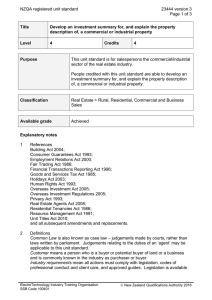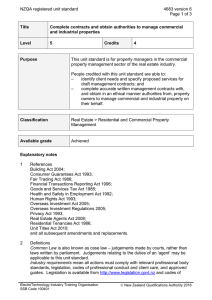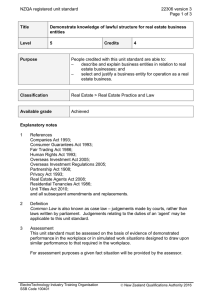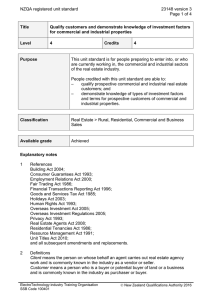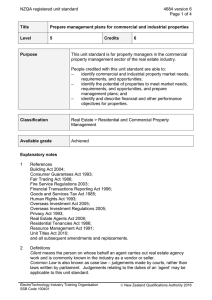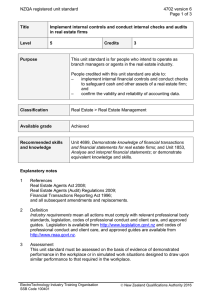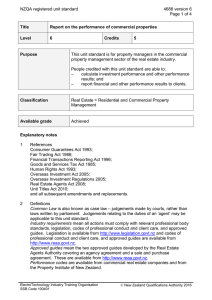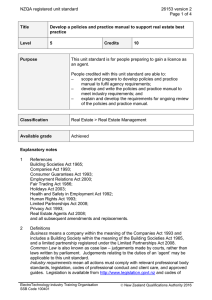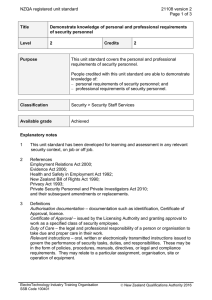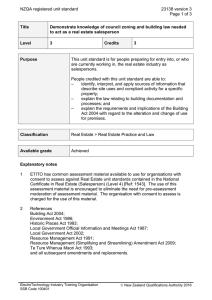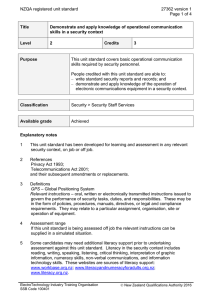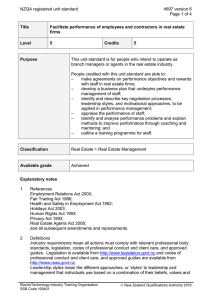NZQA registered unit standard 4694 version 6 Page 1 of 3
advertisement
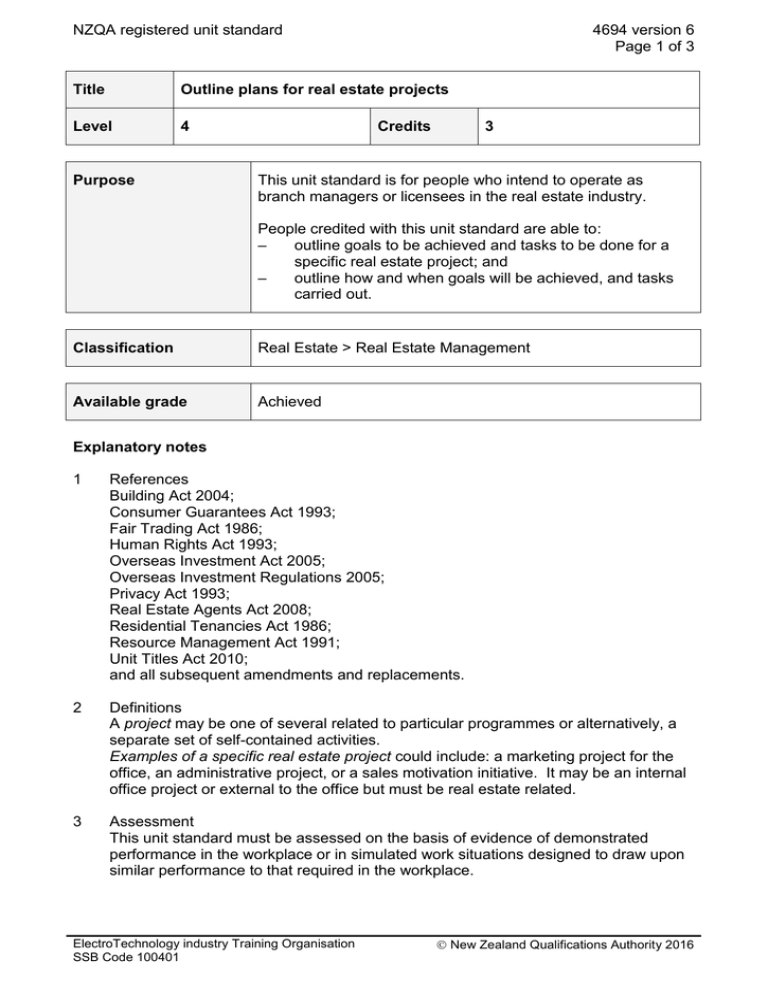
NZQA registered unit standard 4694 version 6 Page 1 of 3 Title Outline plans for real estate projects Level 4 Purpose Credits 3 This unit standard is for people who intend to operate as branch managers or licensees in the real estate industry. People credited with this unit standard are able to: – outline goals to be achieved and tasks to be done for a specific real estate project; and – outline how and when goals will be achieved, and tasks carried out. Classification Real Estate > Real Estate Management Available grade Achieved Explanatory notes 1 References Building Act 2004; Consumer Guarantees Act 1993; Fair Trading Act 1986; Human Rights Act 1993; Overseas Investment Act 2005; Overseas Investment Regulations 2005; Privacy Act 1993; Real Estate Agents Act 2008; Residential Tenancies Act 1986; Resource Management Act 1991; Unit Titles Act 2010; and all subsequent amendments and replacements. 2 Definitions A project may be one of several related to particular programmes or alternatively, a separate set of self-contained activities. Examples of a specific real estate project could include: a marketing project for the office, an administrative project, or a sales motivation initiative. It may be an internal office project or external to the office but must be real estate related. 3 Assessment This unit standard must be assessed on the basis of evidence of demonstrated performance in the workplace or in simulated work situations designed to draw upon similar performance to that required in the workplace. ElectroTechnology industry Training Organisation SSB Code 100401 New Zealand Qualifications Authority 2016 NZQA registered unit standard 4694 version 6 Page 2 of 3 Outcomes and evidence requirements Outcome 1 Outline goals to be achieved and tasks to be done for a specific real estate project. Evidence requirements 1.1 Outline includes the type of real estate project. 1.2 Outline includes goals that are attainable, measurable, time-bound, challenging, contribute to a higher-level goal, and provide a basis for lower- level goals. 1.3 Goals in the outline are consistent with business goals and values, and specify whether goals are to be achieved by individuals or groups. 1.4 Specified tasks relate to outline of goals. Outcome 2 Outline how and when goals will be achieved, and tasks carried out. Evidence requirements 2.1 Tasks are sequenced, resources are assigned, and timeframes are specified. Range one of the following methods – critical path, Pert, Gantt Charts. 2.2 Control measures are detailed, methods to monitor progress are identified, and required feedback is specified. 2.3 Staff participation and contribution to the development of timeframes for goal achievement are encouraged, to facilitate achievement of goal. 2.4 Alternatives to cope with contingencies and conditions that are different from those anticipated are outlined. 2.5 Linkages between other plans, groups, and activities are identified. Planned review date 31 December 2015 ElectroTechnology industry Training Organisation SSB Code 100401 New Zealand Qualifications Authority 2016 NZQA registered unit standard 4694 version 6 Page 3 of 3 Status information and last date for assessment for superseded versions Process Version Date Last Date for Assessment Registration 1 27 July 1995 31 December 2013 Revision 2 13 November 1997 31 December 2013 Review 3 19 January 1999 31 December 2013 Review 4 18 December 2006 31 December 2013 Review 5 12 February 2010 31 December 2013 Rollover and Revision 6 16 August 2012 N/A Consent and Moderation Requirements (CMR) reference 0003 This CMR can be accessed at http://www.nzqa.govt.nz/framework/search/index.do. Please note Providers must be granted consent to assess against standards (accredited) by NZQA, before they can report credits from assessment against unit standards or deliver courses of study leading to that assessment. Industry Training Organisations must be granted consent to assess against standards by NZQA before they can register credits from assessment against unit standards. Providers and Industry Training Organisations, which have been granted consent and which are assessing against unit standards must engage with the moderation system that applies to those standards. Requirements for consent to assess and an outline of the moderation system that applies to this standard are outlined in the Consent and Moderation Requirements (CMR). The CMR also includes useful information about special requirements for organisations wishing to develop education and training programmes, such as minimum qualifications for tutors and assessors, and special resource requirements. Comments on this unit standard Please contact the ElectroTechnology Industry Training Organisation at reviewcomments@etito.co.nz if you wish to suggest changes to the content of this unit standard. ElectroTechnology industry Training Organisation SSB Code 100401 New Zealand Qualifications Authority 2016
